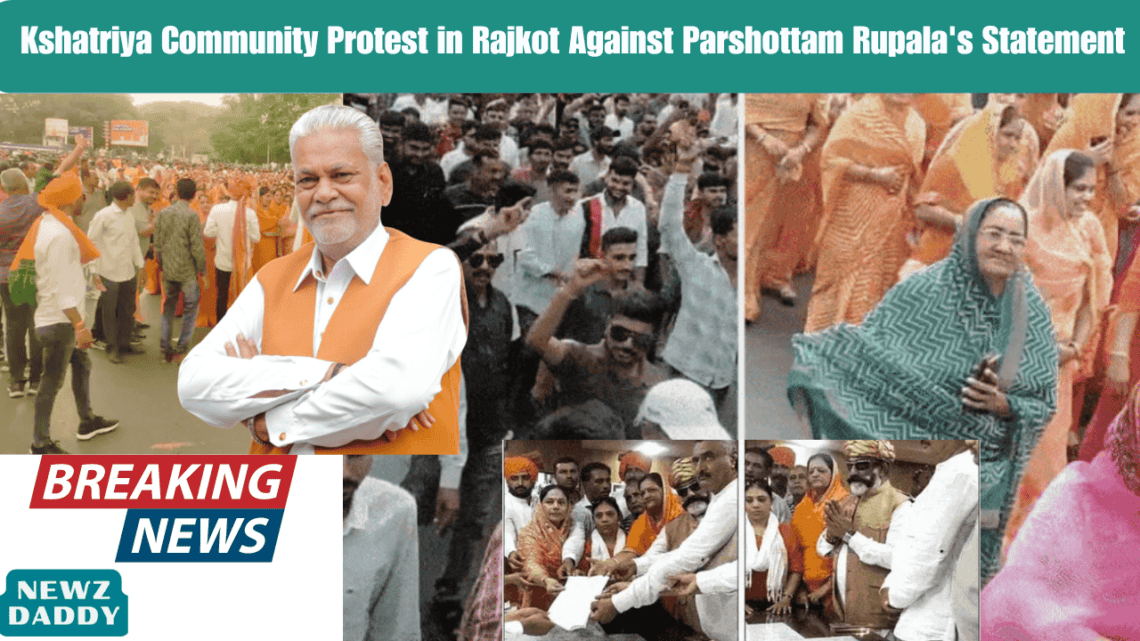Kshatriya Community Protest in Rajkot against Parshottam Rupala’s Statement
Newzdaddy Political Updates
In a significant show of strength and unity, members of the Kshatriya community in Rajkot gathered in large numbers to protest against the BJP candidate Parshottam Rupala and demand the cancellation of his ticket for the Rajkot Lok Sabha seat. The atmosphere was charged with emotion as men and women donned saffron attire, symbolizing their solidarity and determination for change. The rally, organized at Bahumali Bhavan, saw an impressive turnout, with even cricketer Ravindra Singh Jadeja’s sister, Nayanaba, joining the cause.
The Rajput Core Committee, earlier in the day, held a crucial meeting in Rajkot to discuss their grievances against Rupala. The decision to organize a Maharalli, or grand procession, was a culmination of growing discontent within the Kshatriya community. The historical context of the Kshatriya’s contributions to the country, highlighted through the mention of 562 kingdoms, added depth to their demands for political representation that aligns with their values and concerns.
The symbolism of Saffron Attire
The symbolic use of saffron sarees by the women and saffron safas (turbans) by the men underscored not just a fashion statement but a powerful message of unity and purpose. The saffron colour, often associated with sacrifice and determination, resonated strongly with the sentiment of the protest. This visual spectacle not only drew attention but also conveyed a collective resolve to bring about change in the political landscape.
Voicing Dissent
The voices raised during the rally echoed a singular demand – the cancellation of Rupala’s ticket. The discontent stemmed from Rupala’s controversial statements regarding the Kshatriya Samaj, leading to a rupture in his erstwhile support base. The articulation of grievances through chants and placards reflected a community’s frustration with political representation that seemed out of touch with their aspirations and values.
Padminiba Vala’s decision to go on a hunger strike until Rupala’s ticket is cancelled underscored the depth of conviction within the protesting community. Her act resonated with others, with 50 sisters joining her in the fast. This personal sacrifice added a poignant dimension to the protest, highlighting the seriousness of their demands and the lengths they are willing to go to achieve them.
Call for Political Accountability
The rallying cry for cancelling Rupala’s ticket is not just about one individual but represents a broader demand for accountability and representation. The submission of complaints to the Collector and appeals to the state government reflect a strategic approach to exerting pressure through legal and administrative channels. The Kshatriya community’s expectation of justice and fair representation is palpable in their concerted efforts.
The participation of individuals like Nayanaba Jadeja, representing different political affiliations, underscores the non-partisan nature of the protest. This transcending of party lines in favour of community interests amplifies the significance of the issue at hand. It is not just about a political candidate but about safeguarding community pride and ensuring a voice in the corridors of power.
Unity Amidst Diversity
The diversity within the protesting community, encompassing various age groups and socio-political backgrounds, highlights a united front against perceived injustices. The coming together of elders, youth, and women in such large numbers speaks volumes about the grassroots support for the cause. It signifies a collective awakening and a determination to shape their own political destiny.
The challenges posed by administrative hurdles and police arrangements signify the uphill battle faced by the protestors. However, their resilience and unwavering commitment to peaceful protest demonstrate maturity and strategic acumen in pursuing their goals within legal frameworks. The balance between assertiveness and adherence to law and order reflects a nuanced approach to advocacy.
Seeking Dialogue and Resolution
The outreach to government authorities and the anticipation of a response indicate a willingness to engage in dialogue and seek amicable solutions. The community’s expectation of being heard at higher levels of governance, including the Prime Minister’s office, underscores the seriousness of their demands. The onus is now on political leadership to address these grievances and restore trust through concrete actions.
The planned scooter rally and seminars featuring Rupala indicate continued engagement and pressure from both sides. The proactive stance of the protestors in organizing larger gatherings signals a sustained movement aimed at achieving tangible outcomes. The peaceful yet assertive nature of these gatherings reflects a commitment to democratic principles while demanding accountability from elected representatives.
Media Coverage and Public Opinion
The role of media in amplifying such grassroots movements cannot be overstated. The coverage not only brings visibility to the cause but also shapes public opinion and galvanizes support. The narrative of a community standing up for its rights and values resonates widely, garnering empathy and solidarity from diverse quarters of society.
The Maharalli in Rajkot symbolizes more than just a political protest; it represents a quest for dignity, representation, and justice. The unity displayed across generations and backgrounds reflects a collective consciousness that transcends individual interests. As the protest evolves and garners broader support, it underscores the transformative power of grassroots movements in shaping democratic discourse and holding power structures accountable. The journey ahead may be challenging, but the resolve and resilience of the Kshatriya community exemplify the enduring spirit of democracy and citizenship.
Must Read
Lok Sabha Election 2024: 22 Leaders Quit LJP Amidst Allegations




